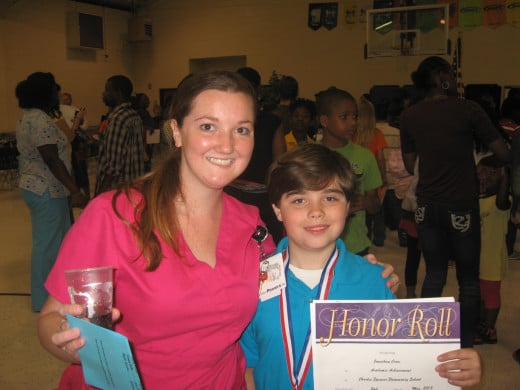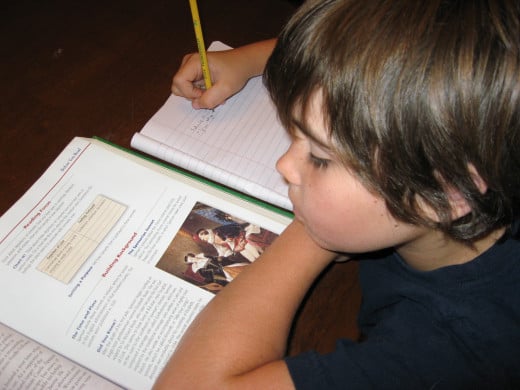Teaching - The Real World

Becoming a Teacher
I’m going to share the real world of teaching with you. First, I’ll provide some background. When I was just a little girl, I dreamed of becoming a teacher. In fact, I conned my friends into playing school with me whenever I could, and of course, I was always the teacher. In school, English was always my favorite subject. I loved reading, writing, and grammar, so my goal of becoming a teacher became more focused – I wanted to be an English teacher at the high school or college level. I was accepted into our local two-year college after completing the eleventh grade, at the age of sixteen. My major was English, and I loved learning more about literature and writing. I also got hired by the college English Department to tutor other students. After almost two wonderful years of college, I was married and pregnant, and my husband and I moved to another town. I thought my desire of becoming a teacher had died a cruel death. I went on to have two more children, and although I was fairly satisfied with my life, I never quite got the idea of being an English teacher out of my mind. I didn’t know it at the time, but I was fated to discover the real world of teaching.

Teaching Degree
When I was twenty-nine years old, my husband and I got divorced. I moved back to my hometown, where I had attended college years earlier. I got remarried, and becoming a teacher was once again possible. I had my mom and dad nearby to keep the kids, and my new husband completely supported my teaching ambition. In just one quarter, I was able to finish my two-year teaching degree. The closest university was about fifty miles away, and I enrolled there to get my four-year teaching degree. I had to drive 100 miles a day, round trip, but I stuck with it. I took an overload every quarter, so I was able to complete my teaching degree in just four quarters.
When you’re seeking a teaching degree, you’ll have to decide what type of teaching you want to do. Do you want to teach early elementary, middle school, or high school? Early childhood education prepares future educators to teach pre-K through fifth grade. Middle grades education prepares students to teach grades four through eight, and students pursuing this degree will need to choose two areas among Language Arts, Reading, Math, Science, and Social Studies. A Secondary Education teaching degree is for those who wish to teach grades six through twelve. With this degree, one subject is chosen. The previous description is a general guideline, as teacher colleges differ somewhat. Some teacher colleges also offer teaching degrees in special education, physical education, reading, and deaf education.
No matter which level and area you choose, there are some general education classes you’ll have to take, but other courses will be specific to the grade level you wish to teach. If you choose to teach middle school or high school, some of the classes you take will be in your chosen subject or subjects.

How To Become A Teacher
To get my teaching degree, I had to take core classes, of course. These included English, history, math, and science. Whenever I had the chance to choose core electives, I always tried to choose classes that would help me be a better English teacher. For example, I took art history and art appreciation classes because I knew there was a lot of overlap among all the humanities. You might want to think about this when you’re working on your teaching degree.
You’ll also have to take specific teaching classes in your endeavor to learn how to become a teacher and to earn your teaching degree. Some of these can be very challenging, while others are extremely easy. Actually, you might think some of the classes are silly. For example, I had to take a class on how to create bulletin boards, which I felt was a total waste of time. I’m creative and semi-intelligent, so I figured I could handle bulletin boards once I started my teaching career. I suppose the class would be beneficial for students who didn’t possess any creativity.
Before you can graduate with a teaching degree, you’ll have to do some “on the job training.” Most colleges will pair you with an actual teacher in your discipline for you to complete your student teaching. This is usually done during your last semester, and in my opinion, it’s the most important aspect of earning your teaching degree. No amount of classes can teach you what you’ll learn from actual experience with students. You won’t be “thrown to the wolves.” The teacher will be there to help you along the way. You’ll begin slowly, and by the end of the semester, you’ll be teaching the classes yourself and coming up with your own lesson plans. In most cases, your college instructors will come to observe while you’re teaching. If any teaching jobs are available at the school in which you’re student teaching, the principal and personnel director will probably observe your teaching methods, also. They might want to hire you to help fill the teaching jobs.
Once you complete and pass all your courses and finish your student teaching and any other requirements, you’ll get your teaching degree. Does that mean you’re ready for teaching jobs? Not quite. So…how to become a teacher? You’ll still have to get your teaching certificate and search for teaching jobs. .


Teaching Certificate
Before I could finalize my hopes of becoming a teacher, I had to get my teaching certificate. Each state has guidelines for its requirements for a teaching certificate. When I was trying to earn mine in Georgia, I first had to pass a major test. The teaching certificate test was very specific to my major. In my case, the exam tested my knowledge of writing, grammar, library science, literature, public speaking, and teaching methods. Some of the test questions could have been answered correctly by a second-grader, while a few of the questions were pretty tough. I remember one: Which writer consistently wrote in the vernacular? Four choices were given. I got the answer right, but I really had to think for a few minutes before answering.
Once you take the teaching certificate test, you’ll receive your results in the mail in a couple of weeks. If you didn’t score high enough on the exam, you’ll get the chance to take it again. Back when I took the test, prospective teachers had six chances to pass the exam. In my opinion, that’s ridiculous. I think a student should have only two chances at the teaching certificate test – anyone can have a bad day. But six times? If you fail the test twice, I think you should have to take more classes or perhaps rethink a teaching career.
Once you pass the test, there might be other requirements you have to fill before receiving your teaching certificate and becoming a teacher. In my case, I had to be fingerprinted and undergo a background check. Once all that was done, I finally got my teaching certificate and was ready for teaching jobs in my area.

Teaching Jobs
Teaching jobs aren’t always available in the schools you wish to teach. I looked in my home town, of course, but I also searched for teaching jobs in the surrounding towns and counties. I went to several interviews and met with principals and department heads. Several principals have told me they prefer hiring hometown people because those teachers are more likely to stay in the system a while. That makes perfect sense to me. To be honest, had I been hired in another county, I would have stayed there only until a teaching job was open in my home town.
At the time, there were no full time teaching jobs open where I did my student teaching. There was, however, one half-time position available, but there were more than twenty teachers vying for the position. I applied for the job, as I figured it would become a full time position sooner or later. I crossed my fingers and said a few prayers. I hoped to be offered the position before I heard back from the teaching jobs in other towns.
I was lucky to land a teaching job right out of college, at my local high school. In fact, it was at my old alma mater, so I was ecstatic. My first year, I taught World Literature. After a couple of years, I began teaching creative writing and American Literature. I also taught journalism and was in charge of the high school newspaper. My first love was British Literature, which was a senior class. After someone retired, I got to teach Brit Lit and Advanced Placement British Literature, and I absolutely loved it!

Teacher Salary
Your first taste of the real world of teaching might be how much you’ll earn from teaching jobs. Of course, you probably checked that out before deciding on becoming a teacher. Teacher salary is set by each state, depending on your teaching degree and on your years of experience. A teacher salary usually includes a supplement from each county or school system, too, and this can vary greatly.
Most people don’t choose to become an educator for the teacher salary. I wanted to be a teacher even back when Georgia was ranked almost dead last for teacher salaries. Thankfully, I stuck with teaching, and once we got some pay increases, Georgia teacher salaries rose. The 2012 starting teacher salary in Georgia for certified teachers was $33,673, and the average teacher salary in the state was $52,815. That makes my state number 26 for starting salaries and number 21 for average salaries.
When you’re thinking of becoming a teacher and looking at your potential teacher salary, you also have to consider a state’s cost of living. Teacher salaries are often assigned a “comfort index,” based on the salary and the cost of living in the state. The lower the assigned number, the friendlier the state is to teachers, from an economical point of view. Georgia is number 12. Connecticut is number 1, and Hawaii is number 50, considered the least friendly state for teacher salary compared to cost of living.
Along with your teacher salary, you’ll also have to consider how many days you’ll be on the job. Many states’ teachers work 190 days a year. Some states, however, have included unpaid furlough days due to the slow economy. Georgia, for example, now has six furlough days, so a teacher’s annual pay is “docked” for those six days. Still, when you consider that many people work 250 days or more a year, you might get a different perspective on teacher pay.
Don’t get me wrong – teaching is hard work! And depending on the subject you teach, you might take a lot of work home with you. You’ll spend a significant amount of time creating lesson plans, grading papers, meeting or talking with parents, and doing other school-related tasks. If you have kids of your own, though, you’ll be off work when they’re out of school, in most cases. You’ll be off every weekend and on all the major holidays, too. Of course, that doesn’t mean you won’t be working at home.

The Real World
Even the very best teaching colleges on the planet won’t fully prepare you for the real world of teaching. Doing so would be impossible. Teaching colleges and classes will provide you with tips and possible teaching strategies, but there’s no way they could cover every possible scenario and every potential student behavior you might encounter during your teaching career.
Once you’re in front of your class, you’re in the real world. Teaching is a wonderful and rewarding career, but it’s not for everyone. No matter how well you know your subject, you’ll find that your first year teaching will be extremely challenging. The toughest part for most new teachers is classroom management. Keeping thirty or so kids on task isn’t easy for beginners. You’ll need to come up with some good classroom management strategies. Forget what you learned in your education classes – you’re in the real world now. Experienced teachers can offer you advice about classroom management, but you’ll need to develop your own classroom management strategies that work best with your teaching style, your personality, and your group of students. Trust me – there’s no one set of guidelines for classroom management that works for everyone.
During your teaching career, you’ll encounter all kinds of students – class clowns, disruptive students, troubled students, lazy students, and downright mean students. You’ll love some of your students, feel sorry for some of them, and want to strangle a few. You’ll also have dealings with all sorts of parents. Some will be supportive, some will be difficult, and some won’t care at all about their child’s education. There will be times when you want to walk out and turn your back on teaching.
Sometimes you’ll feel overwhelmed with work. You’ll have to meet deadlines, prepare students for standardized testing, and follow all sorts of state and federal mandates. You’ll also have to keep all sorts of detailed records. If you haven’t already done so, you’ll need to sharpen your organizational skills and time management strategies.
Something else you’ll need to hone are your teaching methods. Again, veteran teachers might be able to help some, but ultimately, you’ll need to employ your own unique methods of teaching. I don’t believe in “cookie cutter” teaching methods. The same methods of teaching don’t work equally well for all teachers. Also, I feel that students benefit from a wide variety of teaching methods and teaching strategies.
Teaching is one of the most restrictive jobs you can imagine. In most cases, you can't do things when you want to, like take or make a phone call, have a snack, or go to the restroom. Depending on the grade level you teach, you might have to eat with your students. You might have to take them to the restroom. You might have to deal with "potty accidents."
In the real world, teaching is only as good as its administrators and support system. Your principal sets the overall tone and atmosphere of the school, and he or she can help make your job enjoyable or nightmarish. Believe me – I know whereof I speak. I’ve worked for the very best and the very worst.
Your first year of teaching will be the hardest. The second year will be a little easier, and the third will be easier still. If you can get through those first three years, that probably means that you made the right choice in becoming a teacher. If, after three years, you’re miserable teaching, find another career. You might want to stay in the school setting and become a guidance counselor, an administrator, or a media specialist.


Are You Thinking of Becoming a Teacher?
If you’re toying with the idea of becoming a teacher, think long and hard before you commit to getting your teaching degree and your teaching certificate. Teaching might seem like an easy job, but it’s not. You’ll earn every penny of your teaching salary. Teaching jobs aren’t eight to four, as you might think. If the first bell rings at 8:00, you’ll need to be there by 7:30. On some days, you might have to stay at school until after 5:00. Sure, you’re “off” on weekends, but you might spend hours grading papers and creating lesson plans. As an English teacher, I often spent entire weekends grading essays and research papers. And if you think classroom management is tough, just wait until you have to juggle parents, administrators, state guidelines, and your department head. Don’t consider becoming a teacher unless you have a burning desire to teach. If you do, all the challenges and headaches you’ll face with a teaching career won’t matter. You’ll think becoming a teacher is the best thing you ever did!






